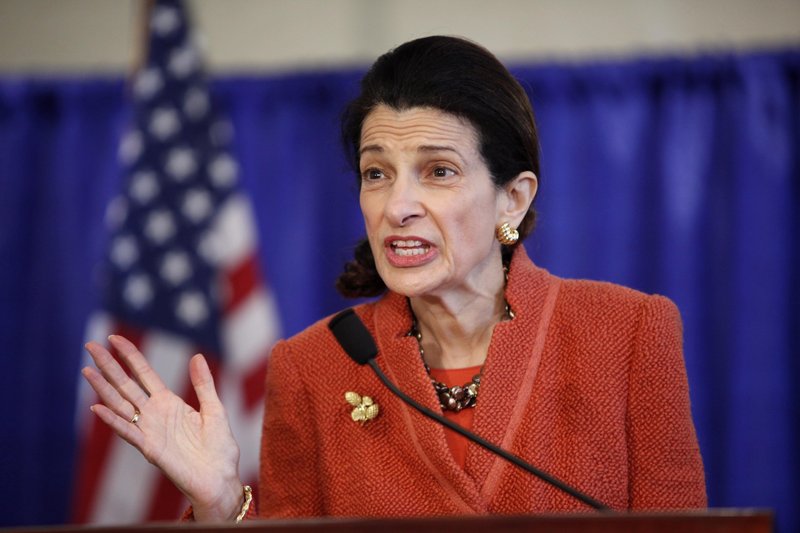WASHINGTON – After a four-month hiatus from national politics, former U.S. Sen. Olympia Snowe is going back on the offensive.
“I may have left the Senate but I haven’t left the fight,” Snowe said Monday.
The Maine Republican’s announcement in February 2012 that she would not seek re-election was widely bemoaned as another sign of the slow death of a moderate, consensus-building caucus in Congress.
Now, with the release of her new book, “Fighting for Common Ground: How We Can Fix the Stalemate in Congress,” Snowe is launching the next major phase in her personal campaign to reform the political institution where she served for 34 years.
In addition to book signings and speaking gigs, the former senator’s schedule for the next seven days reads like an alphabet soup of media networks – CNN, NPR, MSNBC, BBC – in between segments on Fox News Radio and “The Daily Show” with Jon Stewart.
In her book, Snowe lays out a long list of steps that she argues will help return the Senate to the days when compromise was possible on major issues.
“With the same spirit as before, only now working outside Congress, I’ll maintain my fight for these improvements and lend my voice and experience as a consensus-builder and act as a catalyst for change,” Snowe wrote in the book’s introduction.
Snowe, now a senior fellow at the Bipartisan Policy Center think tank in Washington, said in an interview that she raced to complete the book following her retirement in January so that her thoughts could help cultivate a national dialogue about the importance of compromise.
“This is the crucial window where there will be opportunities for solutions to develop between the president and the Congress,” Snowe said. “It was an ambitious time frame but I knew that if we don’t lay the groundwork now, the closer we get to an election year, it obviously becomes infinitely harder.”
“Fighting for Common Ground” lays out a long list of ways to fix Congress, including:
n Primary elections open to all voters, thereby reducing the trend of small numbers of more ideologically extreme party activists choosing nominees.
n Campaign finance reform to lessen fundraising pressure on lawmakers, including counteracting the Citizens United ruling by the Supreme Court that allowed more corporate and union contributions.
n Better use of social media tools — the ones used successfully by the tea party and Occupy movements — to build grassroots support for politicians committed to compromise and building consensus.
While the book is a call to action, it also offers insights into Snowe’s at-times tragic early years — including the loss of her parents and first husband. And it gives some behind-the-scenes glimpses of political moments that either inspired her or drove her decision to retire.
Snowe devotes an entire chapter to the battle over the Affordable Care Act, now commonly referred to as “Obamacare.”
Snowe helped draft a version of the legislation in the Senate Finance Committee and, by her own count, met with President Obama at least eight times and spoke on the phone with him more than a dozen times during development of the bill. She describes a particular one-on-one meeting with Obama just prior to Christmas during a snowstorm in Washington, likening the scene to something out of a Norman Rockwell painting.
“The Obamas’ children, Sasha and Malia, were playing in the snow outside the Oval Office, along with their dog, Bo, while the White House photographer was capturing the moment,” Snowe wrote. But it was at that meeting that Snowe informed Obama she likely could not support the final version of the bill because of changes made by the Democratic leadership. The bill ultimately passed both chambers of Congress in straight party-line votes.
“Though disappointed, the president wished me well and thanked me for all the work and time my staff and I had spent on the legislation,” she recalled. “Later, he wrote me a very thoughtful letter of appreciation for my involvement.”
Snowe also devotes a considerable number of pages to her retirement decision.
She recounts an anguished series of weeks as she deliberated over whether to run again and only her husband, former Maine Gov. John “Jock” McKernan, knew about her doubts. She eventually told her chief of staff, John Richter, but still was not absolutely sure.
“I had John prepare two statements, one for me running, one not; and in truth, I really didn’t decide which one I was going to put out until that day.”
Ultimately, Snowe wrote, she decided she could do more working to change Congress from the outside than she expected she could accomplish during another six-year term in a highly polarized atmosphere.
Snowe said she is hopeful that the current, bipartisan effort on immigration reform is a sign that some of the partisanship on Capitol Hill is giving way. Snowe insists she is not seeing the more bipartisan past through rose-tinted glasses and acknowledges that Congress, by its nature, is often a messy and partisan place. But she said Monday that she longs for the way the Senate used to be when the parties worked together to solve critical issues.
“And that is the real regret, that so much has changed,” Snowe said.
Kevin Miller can be contacted at (207) 317-6256 or at:
kmiller@mainetoday.com
On Twitter: @KevinMillerDC
Send questions/comments to the editors.




Comments are no longer available on this story